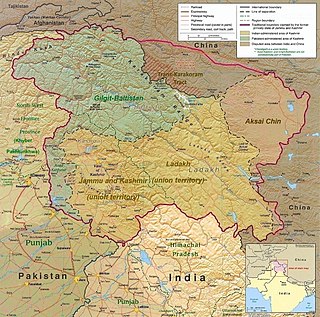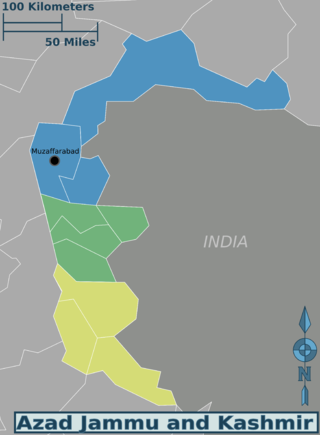
Azad Jammu and Kashmir, abbreviated as AJK and colloquially referred to as simply Azad Kashmir, is a region administered by Pakistan as a nominally self-governing entity and constituting the western portion of the larger Kashmir region, which has been the subject of a dispute between India and Pakistan since 1947. Azad Kashmir also shares borders with the Pakistani provinces of Punjab and Khyber Pakhtunkhwa to the south and west, respectively. On its eastern side, Azad Kashmir is separated from the Indian union territory of Jammu and Kashmir by the Line of Control (LoC), which serves as the de facto border between the Indian- and Pakistani-controlled parts of Kashmir. Geographically, it covers a total area of 13,297 km2 (5,134 sq mi) and has a total population of 4,045,366 as per the 2017 national census.

Poonch District is a district of Pakistan-administered Azad Kashmir in the disputed Kashmir region. It is one of the 10 districts of this Pakistan-administered territory. It is bounded on the north by Bagh District, on the north-east by Haveli District, on the south-east by the Poonch District of Indian-administered Kashmir, on the south by Azad Kashmir's Sudhanoti and Kotli districts, and on the west by Rawalpindi District of Pakistan's Punjab Province. The Poonch District is part of the greater Kashmir dispute between India and Pakistan. The district headquarters is the city of Rawalakot. It is the third most populous district of Azad Kashmir.

Rawalakot is the capital of Poonch district in Azad Kashmir, Pakistan. It is located in the Pir Panjal Range.
The following is a timeline of the Kashmir conflict, a territorial conflict between India, Pakistan and, to a lesser degree, China. India and Pakistan have been involved in four wars and several border skirmishes over the issue.
Pallandri, also spelled Palandri, originally Pulandari, is a Tehsil which serves as the administrative capital of Sudhanoti district of Azad Kashmir. It is located at latitude 33° 42′ 54″ N, longitude 73° 41′ 9″ E, 90 km (56 mi) from Islamabad, the capital of Pakistan. It is connected with Rawalpindi and Islamabad through Azad Pattan road. The main tribe of Pallandri is the Sudhan tribe. Here in Palindri the first Government of Sidhnuti Azad Kashmir on October 4,1947 was established

Sardar Muhammad Ibrahim Khan was a Kashmiri revolutionary leader and politician, who led the 1947 Poonch Rebellion against absolute rule of the Maharaja in the state of Jammu and Kashmir and played a key role in the First Kashmir War, supporting Pakistan. He served as the President of Azad Kashmir for 13 years across four non-consecutive terms and still remains the longest-serving president of the state, since its establishment.
Sudhan is one of the major tribes from the districts of Poonch, Sudhanoti, Bagh and Kotli in Azad Kashmir, allegedly originating from Pashtun areas. The Sudhan Pathans who settled in Azad Kashmir are mainly an important and major branch of the Saduzai tribe who migrated from Afghanistan in the 14th century AD and founded the present-day Azad Kashmir region of Sudhanoti and ruled here for hundreds of years.

The Sudhanoti District, meaning the "heartland of Sudhans" or "Sudhan heartland"),

Poonch District was a district of the princely state of Jammu and Kashmir, which is currently divided between India and Pakistan. The Pakistani part of the erstwhile district is now the Poonch Division in the Azad Kashmir territory, whilst the Indian part of the district is the Poonch district in Jammu and Kashmir. The capital of the Pakistan-controlled side is Rawalakot; while the capital of the Indian-controlled side is Poonch.

The All Jammu and Kashmir Muslim Conference (Urdu: آل جموں و کشمیر مسلم کانفرنس) also shortly referred as Muslim Conference (MC) is a political party in Pakistan administered territory of Azad Jammu and Kashmir. The party was founded by Chaudhry Ghulam Abbas in the former princely state of Jammu and Kashmir as a splinter group of the Jammu & Kashmir National Conference.

Colonel Khan Muhammad Khan was a prominent Sudhan soldier and politician in Poonch, serving in the Legislative Assembly of the princely state of Jammu & Kashmir until 1947. Later he served as the Chairman of the War Council during the 1947 Poonch Rebellion.

Colonel Sher Ahmed Khan, was one of the guerrilla commanders of the Azad Kashmir Movement and also served as the President of Azad Kashmir. He was known as Sher-e-Jang and awarded the Fakhr-i-Kashmir, which is equivalent to Hilal-i-Jurat.

The history of Azad Kashmir, a disputed part of the Kashmir region currently administered by Pakistan, is related to the history of the Kashmir region during the Dogra rule. Azad Kashmir borders the Pakistani provinces of Punjab and Khyber Pakhtunkhwa to the south and west respectively, Gilgit–Baltistan to the north, and the Indian union territory of Jammu and Kashmir to the east.The region is claimed by India as a part of the Jammu and Kashmir union territory and addressed as PoK( Pakistan-occupied Kashmir).
Mong is a city and village in Sudhnoti District of Azad Kashmir, Pakistan.
Sardar Muhammad Abdul Qayyum Khan was a Kashmiri politician who also served as the president and prime minister of Azad Kashmir. He also remained President of All Jammu and Kashmir Muslim Conference for over 20 years. He belonged to the Dhund-Abbassi Tribe.
The Azad Kashmir Regular Force (AKRF), formerly known as the Kashmir Liberation Forces(KLF), were the irregular forces of Azad Kashmir until 1948. They then were taken over by the government of Pakistan and converted into a regular force. In this form, the unit became part of the country's paramilitary forces, operating out of the nominally self-governing territory of Azad Jammu and Kashmir. The AKRF was altered from a functioning paramilitary force and merged into the Pakistan Army as an infantry regiment following the Indo-Pakistani War of 1971.

In spring 1947, an uprising against the Maharaja Hari Singh of Jammu and Kashmir broke out in the Poonch jagir, an area bordering the Rawalpindi district of West Punjab and the Hazara district of the North-West Frontier Province in the future Pakistan. It was driven by grievances such as high taxes, the Maharaja's neglect of World War veterans, and above all, Muslim nationalism with a desire to join Pakistan. The leader of the rebellion, Sardar Muhammad Ibrahim Khan, escaped to Lahore by the end of August 1947 and persuaded the Pakistani authorities to back the rebellion. In addition to the backing, Prime Minister Liaquat Ali Khan authorised an invasion of the state, by the ex-Indian National Army personnel in the south and a force led by Major Khurshid Anwar in the north. These invasions eventually led to the First Kashmir War fought between India and Pakistan, and the formation of Azad Kashmir provisional government. The Poonch jagir has since been divided across Azad Kashmir, administered by Pakistan and the state of Jammu and Kashmir, administered by India.
Major General Muhammad Hayat Khan was an Azad Kashmiri politician who served as the 15th President of Azad Kashmir from 1 November 1978 to 31 January 1983.
PC Pak Search Sudhan Operation was a Pakistani military operation of the 1955 Poonch uprising. The first major operation of the Pakistan Army inside Pakistan, it was conducted against Sudhan tribal insurgents in the Sudhan-majority Sudhanoti, Poonch, Bagh, and Kotli Districts of Azad Kashmir.
The Baral Agreement was an agreement between the government of Pakistan and rebellious Sudhan tribes signed on 20 December 1956 following an armed rebellion by the tribes against Pakistan's rule of Kashmir.











